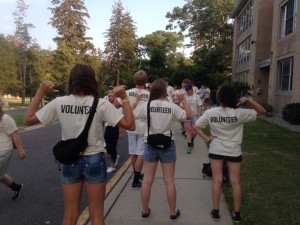At a recent congregational meeting of MacArthur Park Lutheran Church in San Antonio, Texas, a corny skit about a treasure hunt triggered memories of all the “treasures” we’ve discovered through our work this past year with the Southwestern Texas Synod’s pilot Congregation-Initiated Community Based Advocacy (CICBA) program. It’s often tempting to look at what lies ahead in our journeys without reflecting on and celebrating where we’ve been and what we’ve learned along the way.

MacArthur Park Treasure Hunters (L to R): Brenda Krueger, Jeanette Pierce, George Pierce, Lisa Hooter and Jean Schriever
What is CICBA? Well…it’s a mouthful! Congregation-Initiated Community Based Advocacy. As one of six congregations in this three-year pilot program, we are on a journey as people of God to develop skills to identify systemic (real and permanent) causes of poverty in our communities using the tools of community organizing. We are engaging in conversation and action with community partners and people living in poverty in our neighborhood.
Our group of congregations is diverse in settings and contexts, and each has their own unique CICBA journey – border ministry, mission start, rural and urban congregations among them.
But all share one goal: to move from charity to justice and to know the difference between the two.
As we started out over a year ago, most of the CICBA team was new to advocacy and community organizing. So our first retreat was a “Community Organizing 101” intro from Sue Engh, ELCA Program Director for Congregation-Based Organizing. The retreat focused on power analysis (Who has power in our community? What power do we have?) and cara-a-cara. Cara-a-cara, or “one-to-ones,” are relational meetings with each other that give the space for natural, yet uncommon conversation; this paradox emerges as we speak candidly about the parts of our everyday lives we often ignore or cover up. This type of conversation is at the heart of connecting with community leaders and our neighbors to identify assets, priorities and hopes of our community.
We also began to use new language – the vocabulary of community organizing, including concepts such as “problems vs. issues” and strategies to cut big problems into “bite-sized” action items. Team member Bee Moorhead, Executive Director ofTexas Impact, talked about public policy and “issues,” along with important data, including the fact that Texas ranks in the bottom half of the states for political action and electoral participation! This is pretty disappointing, but it also presents a real opportunity for this kind of work here.
After the first retreat, our team practiced one-to ones with each other and the congregation, gaining confidence in the process and learning about gifts, values, passions, and concerns in our midst!
Listen, God Is Calling! – At the second retreat, we kicked the “treasure hunt” into full swing. The stages of community organizing are much like a treasure hunt. By digging deeper into one-to-ones, power analysis, and community partner identification, we unearth riches. In this retreat, we practiced listening as a form of spiritual hospitality and as an opportunity to find out what God is already up to in our neighborhoods, connecting with Jesus’ great commandment to love God and our neighbors as ourselves (Matt 22:27).
At this retreat, we put on our Grace Goggles. Mikka McCracken, Program Director of Constituent Engagement and Interpretation with ELCA World Hunger, accompanies our CICBA program. She spoke about the ELCA’s method ofaccompaniment, reminding us to always listen through a lens of grace amidst cultural and economic differences. So, we all put on “Grace Goggles,” seeing each other as beloved children of God, created in God’s image.

Haven for Hope – Retreat number 3! We listened to a one-to-one conversation of “holy curiosity” between Sue Engh (see picture at right) and Ruth, a woman who, over the course of several months, went from middle-class to homeless due to a series of unexpected health and family events. CICBA groups asked Ruth and her husband questions, which were answered in a friendly and candid way, embracing the “natural, yet uncommon” essence of cara-a-cara. Ruth and her husband shared their journeys into and out of homelessness. The couple met at San Antonio’s Haven for Hope, whose mission is “to offer a place of hope and new beginnings…by providing, coordinating and delivering an efficient system of care for people experiencing homelessness.” We heard their hard truths. Ruth offered us advice when talking to people in poverty: “It’s okay not to be perfect, but [at least] be honest. Walls may be put up – it depends on the day – don’t take it personally.”
The Time Has Come to Act! – At Retreat #4 we are called to action – to keep this at a level of crisis. The crisis is clear: 1 in 6 families live in poverty. 1 in 4 children live in poverty. We have the resources, yet there is the risk of doing nothing because the task is so big. And what happens when we do nothing? Who benefits when we do nothing? We were challenged by a question posed by Dietrich Bonhoeffer: “Are we still of any use?” We then worked to develop a 6 week action plan and Collaborative Table Team, to include new members with gifts to help us identify emerging patterns and clarify the actions of an ongoing Organizing Cycle: LISTEN, RESEARCH, DEVELOP LEADERS, ACT!
What’s Next?
Our conversation and learning do not end here. We continue to seek more community conversation partners. CICBA Team members have talked with an apartment manager, riders on the local bus, a neighborhood barber, pharmacist, pastor and elementary school counselor. We are also looking for ways to further engage in conversation with people experiencing poverty within our neighborhood.
Here are some of our other ideas:
1) Community Partner Program – We are also exploring the possibility of becoming a resource to assist the community with online applications for services such as SNAP food benefits, CHIP health care benefits, Medicaid, Medicare, and Temporary Assistance for Needy Families (TANF). We heard about the need for application assistance through Texas Impact and will explore working with a neighboring church.
2) Economic Justice Workshop – We have recently joined with other faith-based groups, schools and non-profit institutions to launch a community-wide Living Wage and Economic Security campaign in San Antonio. The rallying cry is “Si, se puede!” – “Yes, we can!” Our team made a commitment to talk to our congregation, city councilperson and county commissioner about the issue, and to bring more people to a large, city-wide rally this November.
3) The Cross Marks the Spot – Okay, back to the corny skit. We had some fun pretending to search for exotic treasure as we introduced our congregation to the Community Treasure Hunt which consisted of twelve important community topics paired with challenges and field trips for further digging. Each month, we will have a congregational conversation based on Matthew 25:34-37 on issues that matter within our community: employment, education, homelessness, food assistance, etc. The topics and challenges were created by Texas Impact and can be used for any community, so check it out! Throughout the treasure hunt we learned that “the cross marks the spot.” It is always Jesus’ commandment to love our neighbor as ourselves and Jesus’ love on the cross that informs our commitment to justice. As people of faith, we should know our community.
Our final retreat is planned for February 2015 at Texas Lutheran University, opening with a conference event on Faith-Based Organizing: Our guest speaker will be Alexia Salvatierra, ELCA pastor and co-author of Faith-Rooted Organizing: Mobilizing the Church in Service to the World, and Dr. Ray Pickett, professor of New Testament at Lutheran School of Theology at Chicago, will be our guest preacher. Ray is currently working on a resource to look at the work of Jesus through the lens of community organizing. We will also be among Texas Lutherans at the First Annual ELCA Legislative Event in Austin, Texas in February 2015!
Live the Gospel. Change the World.
Yes, this is a bold vision statement for MacArthur Park Lutheran Church in San Antonio, as the CICBA team and congregation celebrate treasures of community organizing – those already identified and those yet to be unearthed. But we know through faith that we, and the people in our community, are being called “to ventures of which we cannot see the ending…through Jesus Christ.” And with the tools we’ve gained through CICBA, we are ready to start the adventure!
RESOURCES YOU CAN USE

Dr. Ruby Payne’s book A Framework for Understanding Poverty, was especially helpful in understanding the culture of poverty, specifically noting the differences between generational and situational poverty and the “hidden” rules, behaviors and language gaps between those in poverty, the middle class and the wealthy. The book is full of case studies, examples and comparative charts. For example, one of the quizzes asks readers if they could survive living in poverty or living in wealth with a checklist of life situations in each economic level. The exercise was very eye-opening!

Hope at Work – This comic book is about, well…not Superman or Batman…but superheroes of community organizing! “Hope at Work” is an imaginative, fictional cartoon story about a couple from Hope Church who are called to move beyond canned goods drives to “feed God’s sheep”, and the excitement of working with a community group appropriately called “MISHPAT” (Metropolitan Initiative for Strong, Hopeful People Acting Together). The Hebrew term “mishpat” refers to acts of justice in societies and is an important quality of godly communities in the Old Testament. “Hope at Work” was written by Sue Engh, ELCA Director for Congregation-Based Community Organizing and the CICBA leadership team. (The comic book is available at http://www.elca.org/Resources/Congregational-Based-Organizing.)
ELCA Social Statement – A social statement on economic life: Sufficient, Sustainable Livelihood for All – an important resource as we work on the “Living Wage and Economic Security Campaign” http://download.elca.org/ELCA%20Resource%20Repository/Economic_LifeSS.pdf
With thanks to Vi Lien, Mary Lou Walther, Pastor Herb Palmer, Pastor Charles Fredrickson, Sharon Wiggins and the Southwestern Texas Synod for the CICBA Pilot Program. The CICBA program is supported in part by your gifts to ELCA World Hunger.










 People’s Climate March – On Sept. 21, more than 400,000 activists joined together in New York City in what is being called the largest climate march in history. The People’s Climate March called on world leaders to support a global climate change agreement and to act on climate change with over 2,700 events in more than 150 countries. In partnership with The Lutheran World Federation, Lutheran Advocacy Ministry in Pennsylvania, and the Metropolitan New York Synod, hundreds of Lutherans assembled for the march.
People’s Climate March – On Sept. 21, more than 400,000 activists joined together in New York City in what is being called the largest climate march in history. The People’s Climate March called on world leaders to support a global climate change agreement and to act on climate change with over 2,700 events in more than 150 countries. In partnership with The Lutheran World Federation, Lutheran Advocacy Ministry in Pennsylvania, and the Metropolitan New York Synod, hundreds of Lutherans assembled for the march. The U.N. Climate Summit – The weekend of the People’s Climate March, ELCA Environmental Policy Director Mary Minette attended an interfaith conference on climate change at Union Theological Seminary. Following the summit, a delegation of more than 30 faith leaders created an interfaith statement on climate change at an event sponsored by the World Council of Churches. The interfaith statement was presented to the U.N. secretary general during the U.N. Climate Summit later that week. ELCA Advocacy also joined several other climate events in New York sponsored by the ACT Alliance, including strategies on addressing climate disasters, which included as a speaker a Lutheran pastor from New Jersey speaking about Superstorm Sandy recovery, and limiting climate change with low-carbon development strategies.
The U.N. Climate Summit – The weekend of the People’s Climate March, ELCA Environmental Policy Director Mary Minette attended an interfaith conference on climate change at Union Theological Seminary. Following the summit, a delegation of more than 30 faith leaders created an interfaith statement on climate change at an event sponsored by the World Council of Churches. The interfaith statement was presented to the U.N. secretary general during the U.N. Climate Summit later that week. ELCA Advocacy also joined several other climate events in New York sponsored by the ACT Alliance, including strategies on addressing climate disasters, which included as a speaker a Lutheran pastor from New Jersey speaking about Superstorm Sandy recovery, and limiting climate change with low-carbon development strategies. Preparing for midterm elections – Election Day is one month away, and ELCA Advocacy is sending out resources and guides on how to promote civic engagement in Lutheran congregations throughout the country. The electoral process is one way in which we live out our affirmation of baptism to “serve all people, following the example of our Lord Jesus,” and “to strive for justice and peace in all the earth.” Share our
Preparing for midterm elections – Election Day is one month away, and ELCA Advocacy is sending out resources and guides on how to promote civic engagement in Lutheran congregations throughout the country. The electoral process is one way in which we live out our affirmation of baptism to “serve all people, following the example of our Lord Jesus,” and “to strive for justice and peace in all the earth.” Share our 
 Hunger – The Hunger Free Colorado Summit took place on Sept. 8, featuring Sister Simone Campbell of Nuns on the Bus and NETWORK, the Roman Catholic social justice
Hunger – The Hunger Free Colorado Summit took place on Sept. 8, featuring Sister Simone Campbell of Nuns on the Bus and NETWORK, the Roman Catholic social justice At the capitol – LAMPa delivered a letter from Bishop Kusserow, Southwestern Pennsylvania Synod, urging lawmakers to act to end discrimination based on sexual orientation. LAMPa staff brought others engaged in ministry with the homeless to meet with legislative leaders to push for passage of bills to expand the state Housing Trust Fund. The visits were made powerful by the presence of one mother, accompanied by the Rev. Matthew Lenahan, who shared how a Lutheran congregation in Lancaster County is walking with her as she struggles with homelessness. Collaborating with the Lower Susquehanna Synod on a food drive/hunger advocacy project, LAMPa accompanied youth motivated by a synod retreat themed “Hungry” to participate in the “Can Hunger” event at the capitol, where they spoke with the leader of the legislative hunger caucus.
At the capitol – LAMPa delivered a letter from Bishop Kusserow, Southwestern Pennsylvania Synod, urging lawmakers to act to end discrimination based on sexual orientation. LAMPa staff brought others engaged in ministry with the homeless to meet with legislative leaders to push for passage of bills to expand the state Housing Trust Fund. The visits were made powerful by the presence of one mother, accompanied by the Rev. Matthew Lenahan, who shared how a Lutheran congregation in Lancaster County is walking with her as she struggles with homelessness. Collaborating with the Lower Susquehanna Synod on a food drive/hunger advocacy project, LAMPa accompanied youth motivated by a synod retreat themed “Hungry” to participate in the “Can Hunger” event at the capitol, where they spoke with the leader of the legislative hunger caucus. On the road – LAMPa staff participated in Bishops convocations in the Allegheny and Lower Susquehanna synods, the launch of a hunger team in the Southeastern Pennsylvania Synod, a Lutherans Restoring Creation and training in the Northwestern Pennsylvania Synod and the People’s Climate March in New York City. We conducted our biennial survey to establish LAMPa’s agenda for the next legislative term. The results showed education and health care to be top priorities after hunger and were analyzed at our policy council retreat.
On the road – LAMPa staff participated in Bishops convocations in the Allegheny and Lower Susquehanna synods, the launch of a hunger team in the Southeastern Pennsylvania Synod, a Lutherans Restoring Creation and training in the Northwestern Pennsylvania Synod and the People’s Climate March in New York City. We conducted our biennial survey to establish LAMPa’s agenda for the next legislative term. The results showed education and health care to be top priorities after hunger and were analyzed at our policy council retreat. Promoting advocacy – Faith Action Network’s 15 geographic clusters convened to discuss effective types of advocacy efforts in faith communities in Washington, share FAN updates, and talk about future collaborations. Meanwhile, ongoing meetings with state legislators and members of congress continued. This month FAN met with multiple legislators, including the state House Republican leader, state Senate Democratic leader and her district House member, and a federal House member meeting with members of an African American Baptist church. FAN is also currently getting ready for our Annual Dinner on Nov. 16 where local philanthropist and travel guide speaker Rick Steves will speak on the importance of faith-based advocacy. U.S. Sen. Patty Murray has also been invited.
Promoting advocacy – Faith Action Network’s 15 geographic clusters convened to discuss effective types of advocacy efforts in faith communities in Washington, share FAN updates, and talk about future collaborations. Meanwhile, ongoing meetings with state legislators and members of congress continued. This month FAN met with multiple legislators, including the state House Republican leader, state Senate Democratic leader and her district House member, and a federal House member meeting with members of an African American Baptist church. FAN is also currently getting ready for our Annual Dinner on Nov. 16 where local philanthropist and travel guide speaker Rick Steves will speak on the importance of faith-based advocacy. U.S. Sen. Patty Murray has also been invited. Every request to which we answer “yes” implies an investment. When we choose to invest our time in a new friend or game we show what values are important to us. Do you spend all day playing online games? If so, you reveal that you enjoy and value those activities. Do you actually communicate with the “friends” or “followers” you have on Facebook, Twitter, or Instagram? If not, why did you say yes to their invitations?
Every request to which we answer “yes” implies an investment. When we choose to invest our time in a new friend or game we show what values are important to us. Do you spend all day playing online games? If so, you reveal that you enjoy and value those activities. Do you actually communicate with the “friends” or “followers” you have on Facebook, Twitter, or Instagram? If not, why did you say yes to their invitations?